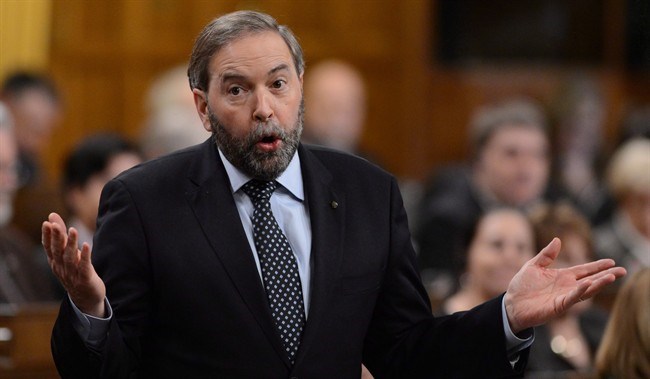OTTAWA - Tom Mulcair says he has nothing to learn from Conservatives about how an official Opposition leader should comport himself when travelling outside sa���ʴ�ý.
Indeed, the NDP leader says the Tories — who've been bashing him all week for allegedly "trash talking" sa���ʴ�ý during a visit to Washington and New York — seem to have forgotten the way they behaved in Opposition.
"All of a sudden there's a rule that they've decided that you're not supposed to talk about the government (while abroad) now that they're the government but when they were the Opposition there was no problem talking about the government," Mulcair said in an interview at the conclusion of his trip.
"So people can take that with a grain of salt."
When Prime Minister Stephen Harper was in Mulcair's shoes, he didn't hesitate to denounce the Liberal governments of the day to American audiences.
He co-wrote a 2003 article in the Wall Street Journal bemoaning Chretien's "serious mistake" in refusing to join the U.S.-led war in Iraq.
"For the first time in history, the Canadian government has not stood beside its key British and American allies in their time of need," he wrote.
He made his own obligatory trip to Washington in 2005, where he stoked American fears that sa���ʴ�ý was soft on terrorism. Among other things, he accused Liberals of consorting with ethnic groups that were linked to terrorist organizations.
Before becoming official Opposition leader, Harper gave a notorious speech — albeit in Montreal — to the U.S. Council for National Policy, in which he derided sa���ʴ�ý as "a northern European welfare state in the worst sense of the term."
By that standard, Mulcair's criticisms of the Harper government's environmental record and his lack of enthusiasm for the Keystone XL pipeline were relatively tame.
But his musings were clearly unwelcome to the government, coming just as cabinet ministers and western premiers were on a charm offensive aimed at quelling Americans' anxiety about the environmental impact of the pipeline, which would carry Alberta oil sands crude to Gulf Coast refineries.
Foreign Affairs Minister John Baird clucked that Mulcair was "trash talking" sa���ʴ�ý, undermining efforts to win approval for the pipeline. Saskatchewan Premier Brad Wall accused him of "betraying Canadian interests."
Nonsense, Mulcair said.
"These are important moments where you get to define who you are as the official Opposition and a government-in-waiting. So, of course, you're going to be saying what the differences are with the sitting government," he said.
"Nothing new about that and certainly nothing unusual about that. You know, it's a compulsory figure."
Moreover, Mulcair insisted he said nothing to his various American audiences that he hasn't been saying for months back home in sa���ʴ�ý about the Tories' lamentable environmental record and the NDP's preference for sustainable development of natural resources, creating value-added refinery jobs in sa���ʴ�ý and building a pipeline to carry western oil to the east coast.
"Surprising as it might sound to some of the Conservatives and those who work with them, Americans do know how to read," Mulcair said.
"I think the Conservatives somehow have this magic thought that they can withdraw from Kyoto (climate change treaty), gut environmental legislation and nobody will find out about it."
One of Mulcair's stops was a private speech to the Canadian-American Business Council, which was not shocked by anything the NDP leader had to say.
"He just talked about his priorities and ... didn't, if you want to say, trash talk the current government," the council's executive director, Emma Rigby, said in an interview.
"He just talked about how one of his priorities is sustainable development of energy resources, in particular the oil sands. He expressed his concerns about them but also he told the group that it's still in sa���ʴ�ý's national interest to develop them."
None of that came as a surprise to the business leaders in attendance.
"People know exactly his agenda. Our members are well-informed business leaders with companies that operate on both sides of the border and they follow very closely Canadian politics," Rigby said.
On Keystone specifically, Mulcair said he made it clear "it wouldn't be one of our priorities" but avoided giving any advice to President Barack Obama, who is expected to decide the pipeline's fate by the summer.
"My whole purpose has been to say that the Americans are going to take a decision on this or any other file based on America's best interests. As a Canadian leader, I'm saying that an NDP government would take decisions based on sa���ʴ�ý's self interests.
"In particular, we would make sure that we would add as many jobs as we can to our raw natural resources, add the value here ... We would take care of sa���ʴ�ý's own energy security first by bringing product west to east."
After meeting with Mulcair and two other NDP MPs, Nancy Pelosi, the powerful Democratic leader in the House of Representatives, signalled her doubts about the merits of Keystone, saying "Canadians don't want the pipeline in their own country."
She implied that she had gleaned that knowledge from the NDP delegation but Mulcair's office said neither the leader nor his MPs said anything like that.



